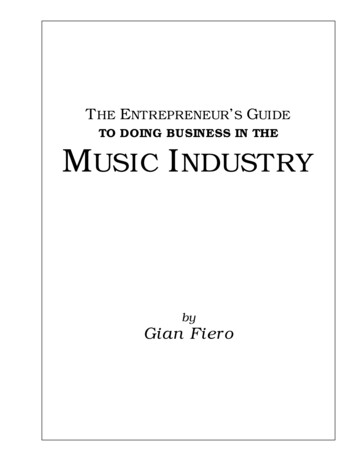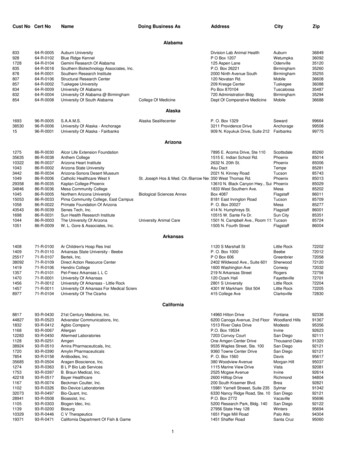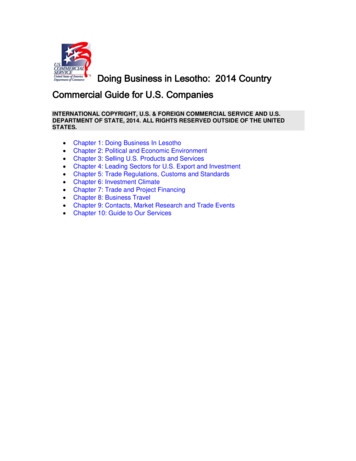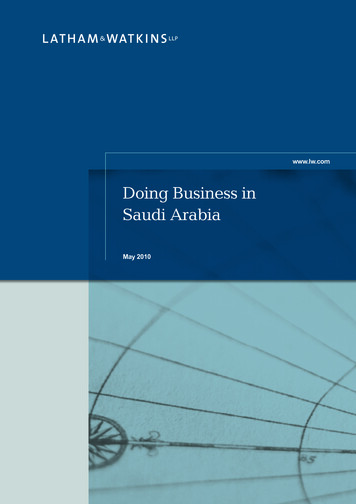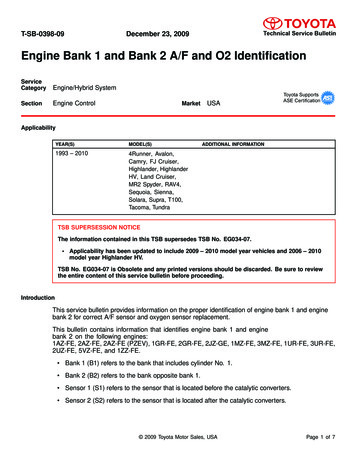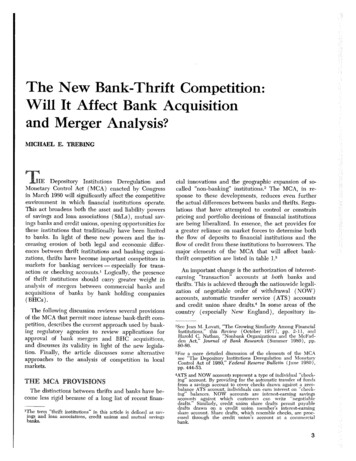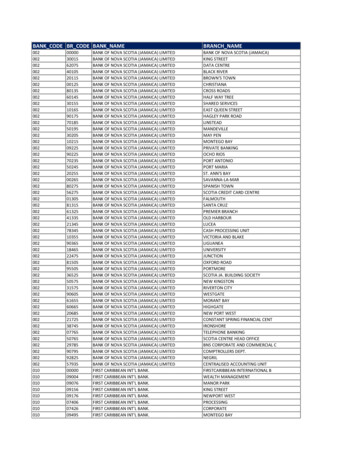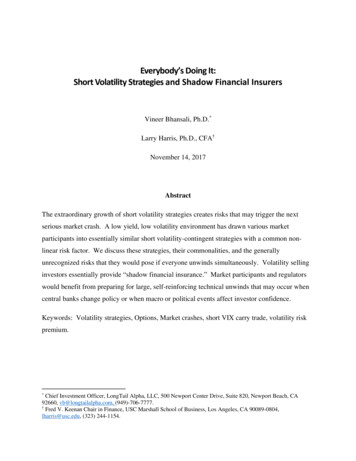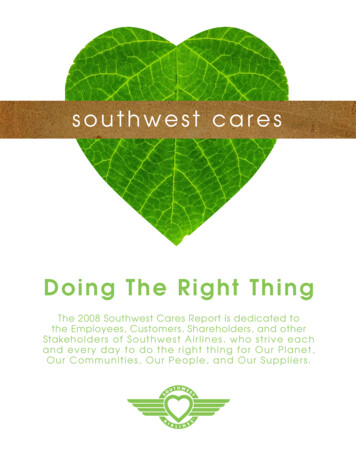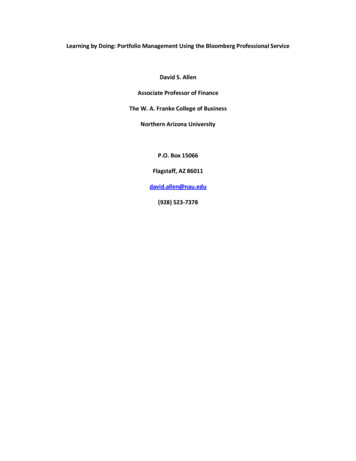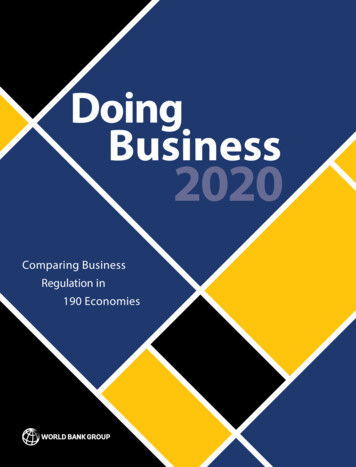
Transcription
DoingBusiness2020Comparing BusinessRegulation in190 Economies
DoingBusiness2020Comparing BusinessRegulation in190 Economies
2020 International Bank for Reconstruction and Development / The World Bank1818 H Street NW, Washington, DC 20433Telephone: 202-473-1000; Internet: www.worldbank.orgSome rights reserved1 2 3 4 22 21 20 19This work is a product of the staff of The World Bank with external contributions. The findings,interpretations, and conclusions expressed in this work do not necessarily reflect the views of TheWorld Bank, its Board of Executive Directors, or the governments they represent. The World Bank doesnot guarantee the accuracy of the data included in this work. The boundaries, colors, denominations,and other information shown on any map in this work do not imply any judgment on the part of TheWorld Bank concerning the legal status of any territory or the endorsement or acceptance of suchboundaries.Nothing herein shall constitute or be considered to be a limitation upon or waiver of the privilegesand immunities of The World Bank, all of which are specifically reserved.Rights and PermissionsThis work is available under the Creative Commons Attribution 3.0 IGO license (CC BY 3.0 . Under the Creative Commons Attribution license, youare free to copy, distribute, transmit, and adapt this work, including for commercial purposes, underthe following conditions:Attribution—Please cite the work as follows: World Bank. 2020. Doing Business 2020. Washington,DC: World Bank. DOI:10.1596/978-1-4648-1440-2. License: Creative Commons Attribution CCBY 3.0 IGOTranslations—If you create a translation of this work, please add the following disclaimer along withthe attribution: This translation was not created by The World Bank and should not be consideredan official World Bank translation. The World Bank shall not be liable for any content or error inthis translation.Adaptations—If you create an adaptation of this work, please add the following disclaimer along withthe attribution: This is an adaptation of an original work by The World Bank. Views and opinionsexpressed in the adaptation are the sole responsibility of the author or authors of the adaptationand are not endorsed by The World Bank.Third-party content—The World Bank does not necessarily own each component of the contentcontained within the work. The World Bank therefore does not warrant that the use of any thirdparty-owned individual component or part contained in the work will not infringe on the rights ofthose third parties. The risk of claims resulting from such infringement rests solely with you. If youwish to re-use a component of the work, it is your responsibility to determine whether permission isneeded for that re-use and to obtain permission from the copyright owner. Examples of componentscan include, but are not limited to, tables, figures, or images.All queries on rights and licenses should be addressed to World Bank Publications, The World BankGroup, 1818 H Street NW, Washington, DC 20433, USA; e-mail: pubrights@worldbank.org.ISBN (paper): 978-1-4648-1440-2ISBN (electronic): 978-1-4648-1441-9DOI: 10.1596/978-1-4648-1440-2Cover design: Bill Pragluski, Critical StagesLibrary of Congress Control Number: 2019951789
Resources on theDoing Business websiteCurrent featuresHistorical dataNews on the Doing Business projecthttp://www.doingbusiness.orgCustomized data sets since kingsLaw libraryHow economies rank—from 1 to 190http://www.doingbusiness.org/rankingsOnline collection of business laws andregulations relating to taAll the data for 190 economies—topicrankings, indicator values, lists ofregulatory procedures and detailsunderlying Access to previous editions of DoingBusiness as well as subnational and regional studies, case studies andcustomized economy and regional ologyThe methodologies and research papersunderlying Doing searchAbstracts of papers on Doing Businesstopics and related policy utorsMore than 15,000 specialists in190 economies who participate inDoing Businesshttp://www.doingbusiness.org/contributors /doing-businessEntrepreneurship dataData on new business density (numberof newly registered companies per 1,000working-age people) for 156 economieshttp://www.doingbusiness.org/data /exploretopics/entrepreneurshipEase of doing business scoreData benchmarking 190 economies tothe best regulatory practice and an easeof doing business score calculatorhttps://www.doingbusiness.org/data /doing-business-scoreDoing Business reformsShort summaries of DB2020 businessregulation reforms and lists of reformssince DB2006http://www.doingbusiness.org/reformsiii
Contentsvii Forewordix Acknowledgments1 OverviewTackling burdensome regulation17 Chapter 1About Doing Business29 Chapter 2The effects of business regulation41 Chapter 3Removing obstacles to entrepreneurship57 Chapter 4Employing workers67 Chapter 5Contracting with the government77 Chapter 6Ease of doing business score and ease of doing business ranking87 Chapter 7Summaries of Doing Business reforms in 2018/19129 Chapter 8References oing Business 2020 is the 17th in aDseries of annual studies investigatingthe regulations that enhancebusiness activity and those thatconstrain it. Doing Business presentsquantitative indicators on businessregulations and the protectionof property rights that can becompared across 190 economies—from Afghanistan to Zimbabwe—andover time. egulations affecting 12 areas ofRthe life of a business are covered:starting a business, dealing withconstruction permits, gettingelectricity, registering property,getting credit, protecting minorityinvestors, paying taxes, tradingacross borders, enforcing contracts,resolving insolvency, employingworkers, and contracting with thegovernment. The employing workersand contracting with the governmentindicator sets are not included in thisyear’s ranking on the ease of doingbusiness. ata in Doing Business 2020 areDcurrent as of May 1, 2019. Theindicators are used to analyzeeconomic outcomes and identifywhat reforms of business regulationhave worked, where and why.v
ForewordThe Doing Business 2020 study shows that developing economies are catchingup with developed economies in ease of doing business.Still, the gap remains wide. An entrepreneur in a low-income economy typically spends around 50 percent of the country’s per-capita income to launcha company, compared with just 4.2 percent for an entrepreneur in a high- income economy. It takes nearly six times as long on average to start a businessin the economies ranked in the bottom 50 as in the top 20.There’s ample room for developing economies to catch up with developedcountries on most of the Doing Business indicators. Performance in the area of legalrights, for example, remains weakest among low- and middle-income economies.Doing Business recognizes the important work countries have done to improvetheir regulatory environments. Among the 10 economies that advanced themost, efforts were focused on the areas of starting a business, dealing with construction permits, and trading across borders. In general, economies that scorethe highest share several features, including the widespread use of electronicsystems and online platforms to comply with regulatory requirements.At the same time, the least reformed area was resolving insolvency. Putting inplace reorganization procedures reduces the failure rates of small and medium-sizeenterprises and prevents the liquidation of insolvent but viable businesses.Doing Business is a valuable tool that governments can use to design soundregulatory policies. By giving policymakers a way to benchmark progress, itstimulates policy debate, both by exposing potential challenges and by identifying good practices and lessons learned.It’s important to note that Doing Business isn’t meant to be an investment guide,but rather a measurement of ease of doing business. Potential investors considermany other factors, such as the overall quality of an economy’s business environment and its national competitiveness, macroeconomic stability, development ofthe financial system, market size, rule of law, and the quality of the labor force.Ease of doing business is an important springboard to structural reforms thatencourage broad-based growth. The World Bank Group stands ready to helpcountries move forward.David R. MalpassPresidentThe World Bank Groupvii
AcknowledgmentsData collection and analysis for Doing Business 2020 were conducted by ateam led by Santiago Croci (Program Manager, Doing Business) under thegeneral direction of Rita Ramalho (Senior Manager, Global IndicatorsGroup, Development Economics). Overall guidance for the preparation ofthe study was provided by Simeon Djankov (Senior Director, DevelopmentEconomics). The project was managed with the support of Adrian Gonzalez,Charlotte Nan Jiang, Valentina Saltane, and Hulya Ulku. Other team membersincluded Marwa Abdou, Youmna Al Hourani, Lucia Arnal Rodriguez, YuriyValentinovich Avramov, Ogma Dessirama Bale, Elodie Bataille, Farihane BenYedder, Erica Bosio, Liliya F Bulgakova, Kamal Chakaroun, Édgar Chávez,Maria-Magdalena Chiquier, Cyriane Marie Coste, Sabrina Fantoni Custodio,Najah Nina Dannaoui, Theophile de Saint Sernin, Marie Lily Delion, NadineDiMonte, Varun Eknath, Viktoriya Ereshchenko, Vanessa Maria CervelloFerrando, Dorina Peteva Georgieva, Claudia Gonzalez Cobos, Tom KairuzHarb, Becem Hassen, Maho Hatayama, Maksym Iavorskyi, Amina NaomiIdris, Hervé Kaddoura, New Doe Kaledzi, Klaus Koch-Saldarriaga, OlgaKuzmina, Sarah Kouhlani Nolla, Iryna Lagodna, Loic Sebastien Lanci,Anouk Leger, Joseph Lemoine, Tiziana Londero, Silvia Carolina LopezRocha, Courtney Masters, Raman Maroz, Rumbidzai Maweni, MargheritaMellone, Nuno Filipe Mendes Dos Santos, Frederic Meunier, Joanna Nasr,Marie-Jeanne Ndiaye, Albert Nogués i Comas, Nadia Novik, EsperanzaPastor Núñez de Castro, Adjoua Marie-Pascale Nzi, Enrique Orellana Tamez,Alexia Pimbli, Marion Pinto, Greta Polo, Oleksandra Popova, Maria AntoniaQuesada Gámez, Parvina Rakhimova, Mariyam Raziyeva, Nathalie ReyesBenjumea, Martin Ruiz-Cantu, Julie Anne Ryan, Syuzanna Simonyan,Katarzyna Sokal, Ines Sosa, Jayashree Srinivasan, Mihaela Stangu, ErickTjong, Judith Trasancos Rodríguez, Farrukh Umarov, Yulia BorisovnaValerio, Rongpeng (Tiffany) Yang, Marilyne Youbi, Inés Zabalbeitia Múgica,Yasmin Zand, Dou Zhang, and Muqiao (Chloe) Zhang.Yaser Abdulrahman H Alhusaini, Meshal Abdulaziz Alkhowaiter,Daad Abdullah Alshabanah, Adnane Ayeb, Tomilehin Folake Babafemi,Tsenguunjav Byambasuren, Maria Alejandra Castellanos Chavarria, MarieJose Anne Caroline Chatelain, Maxime Delavallee, Ava Josyane ArmandeDrai, Shoola Dzhumaeva, Nadine Khaled Eloseily, Caleb Enrique Espinoza,Jade Christian Hachem, Ritika Narayan Iyer, Guyu Jiang, Zan Jin, ClemensMathis Henrik Graf von Luckner, Daniel Anselmo Marechal, Morris J.ix
xDOING BUSINESS 2020McGinn, Kensi Poukouta, Carolina Nugnes, Ngozi Joann Nwanta, AlexandreFujishima Silveira de Oliveira, Lodovico Onofri, Lidia Panarello, ManishaPanda, Michele Franchetti Pardo, Roxane Louise Manijeh Peloux, ZiyueQiu, Hyung Sub Roh, Lukshmee Saravanapavan, Bit Na Ra Shin, KimberlySuárez-Contreras, Lluis Dalmau Taules, and Qunrui Zhou, assisted in themonths before publication.The team is grateful for the valuable comments provided by colleagues,both within and outside the World Bank Group, and for the guidance provided by World Bank Group Executive Directors.
OVERVIEWTackling burdensomeregulationWorldwide, 115 economies made it easier to do business.The economies with the most notable improvement inDoing Business 2020 are Saudi Arabia, Jordan, Togo, Bahrain,Tajikistan, Pakistan, Kuwait, China, India, and Nigeria.Only two African economies rank in the top 50 on the easeof doing business; no Latin American economies rank inthis group.1
2DOING BUSINESS 2020At its core, regulation is about freedom to do business. Regulationaims to prevent worker mistreatment by greedy employers (regulation of labor), to ensure that roads and bridges do not collapse (regulation of public procurement), and to protect one’s investments (minorityshareholder protections). All too often, however, regulation misses its goal,and one inefficiency replaces another, especially in the form of governmentoverreach in business activity. Governments in many economies adopt ormaintain regulation that burdens entrepreneurs. Whether by intent orignorance, such regulation limits entrepreneurs’ ability to freely operate aprivate business. As a result, entrepreneurs resort to informal activity, awayfrom the oversight of regulators and tax collectors, or seek opportunitiesabroad—or join the ranks of the unemployed. Foreign investors avoid economies that use regulation to manipulate the private sector.By documenting changes in regulation in 12 areas of business activity in 190 economies, Doing Business analyzes regulation that encouragesefficiency and supports freedom to do business.1 The data collected byDoing Business address three questions about government. First, when dogovernments change regulation with a view to develop their private sector?Second, what are the characteristics of reformist governments? Third, whatare the effects of regulatory change on different aspects of economic orinvestment activity? Answering these questions adds to our knowledge ofdevelopment.With these objectives at hand, Doing Business measures the processesfor business incorporation, getting a building permit, obtaining an electricity connection, transferring property, getting access to credit, protectingminority investors, paying taxes, engaging in international t
Worldwide, 115 economies made it easier to do business. The economies with the most notable improvement in Doing Business 2020 are Saudi Arabia, Jordan, Togo, Bahrain, Tajikistan, Pakistan, Kuwait, China, India, and Nigeria. Only two African economies rank in the top 50 on the ease of doing business; no Latin American economies rank in this group.
